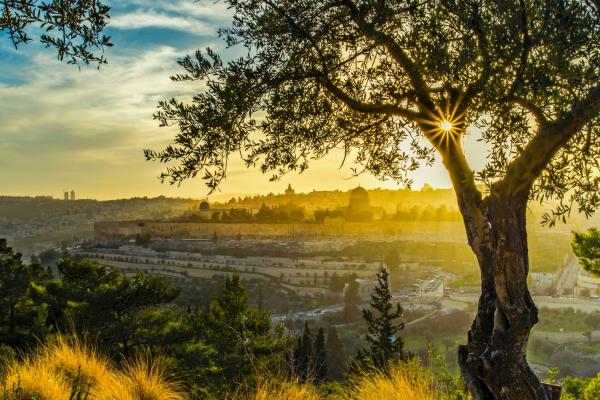Since the day God called Abram to leave his father’s household and go to a land He would show him, promising this land to him and his descendants as an everlasting possession, the Children of Israel have been a Chosen People inseparably tied to a Chosen Land. Sadly however, for most of the history of Israel, the Chosen People have been forced to live outside this land.
During the time of Joseph, Jacob and all his family were driven from the land by a great famine. They settled in Egypt. At first they prospered, but as generations passed they came to be viewed as a threat and were enslaved. After God delivered them from bondage and, through Moses, led them in an exodus from Egypt, they wandered in the desert for 40 years. Eventually Joshua led them across the Jordan River into Canaan, the Promised Land. This was about 1400 B.C.
After conquering the land of Canaan, the Israelites lived under the rule of various judges until in the days of the prophet Samuel they cried for a king to rule over them. God gave them what they wanted. Following the reign of Saul, David and Solomon ushered in a golden age for Israel, a time of great prosperity and expansion for the nation. But after Solomon, the kingdom was divided. The Northern Kingdom, made up of ten of Israel’s tribes, became known as the Kingdom of Israel. The Southern Kingdom —the Tribes of Judah and Benjamin (and some from Levi, the priestly tribe) became known as the Kingdom of Judah. It included Jerusalem.
In 722 B.C., the invading Assyrians overran the Northern Kingdom. Its population was dispersed throughout the Assyrian Empire. There is no record of them ever returning to their land. This is the origin of the great mystery of the “Lost Tribes of Israel.” In 586 B.C., Nebuchadnezzar and the Babylonians defeated the Southern Kingdom of Judah and took much of its population to Babylon. Just as God had promised, however, after 70 years the people miraculously returned to Jerusalem. Solomon’s magnificent temple had been destroyed, though, when the Holy City was captured. Those who returned built a new temple, known as the Second Temple.
For the next five centuries, until Messiah’s birth, the history of Israel recounts that the Jewish People lived in their land under the control of the Persians, the Greeks, and then the Romans. Only briefly during the Maccabean Revolt of the second century B.C. did the Jews enjoy self-determination. Soon afterward, the Romans conquered the land and subjugated the people.
Rome’s rule was marked by a series of increasingly violent revolts and uprisings. The Jewish People particularly despised having their religion controlled by the Romans, who selected rotating high priests in defiance of the Law given by Moses. Roman legions under Titus destroyed the city of Jerusalem and the Temple in 70 A.D., a direct fulfillment of Jesus’ prophecy that “not one stone shall be left here upon another that shall not be thrown down” (see Matthew 24:2). The final Jewish uprising was the Bar Kochba Revolt in 132-136 A.D. After six Roman legions crushed the rebellion, the Jews were dispersed throughout the empire and forbidden from entering Jerusalem. For almost 1,900 years, the Jews wandered the earth, a people without a homeland. During the centuries that followed, grave persecutions followed the Jews wherever they went. They were blamed for causing plagues, falsely accused of using the blood of Christian babies to celebrate Passover, and often referred to as “Christ-killers.” Waves of persecution during the Crusades, the Inquisition, and numerous pogroms killed untold thousands. Yet throughout, the Jewish People never lost hope that one day they would return.
“Next year in Jerusalem,” was their heart’s cry through the centuries.
The dream of returning to their homeland and rebuilding it again one day remained, and in the late 1800s the history of Israel records that thousands of Jews began immigrating to Israel, then under control of the Ottoman Turkish Empire. They primarily came from Eastern Europe and settled in the land as farmers. Known as the First Aliyah, these early settlers struggled for survival in a hostile environment. Early leaders such as Eliezer Ben Yehuda, who revived the use of Hebrew as a language, helped prepare the way for the Jews to return. Ben Yehuda created a Hebrew dictionary so that Jews coming from all over the world could have a common language.
Much of the funding for Jews to return to Israel and purchase land came from the wealthy Rothschild banking family, particularly Walter Rothschild of England. The family’s donations provided the means necessary to establish the beginnings of the modern nation of Israel. Without this funding it would not have been possible for the early settlers to survive and the history of Israel may have been different.
Read “History of Israel, Part 2: The Birth of Zionism,” and “History of Israel, Part 3: The Holocaust and Rebirth of Israel.”
To learn more about Jewish Voice Ministries, visit our website where you can: discover the Jewish roots of Christianity; learn about our humanitarian outreaches, festivals, and special events; register for outreaches; read more about Yeshua, Messianic Judaism, and real Jewish People who came to faith in Yeshua; become a prayer partner; send us a prayer request; or place an order from our secure online store. The Jewish Voice Blog has outreach stories, photos, prayer points, events, and Middle East news updates. Visit our website at www.JewishVoice.org and our blog at www.JewishVoiceBlog.org . You can also join us on Facebook, Twitter, LinkedIn, and YouTube.











